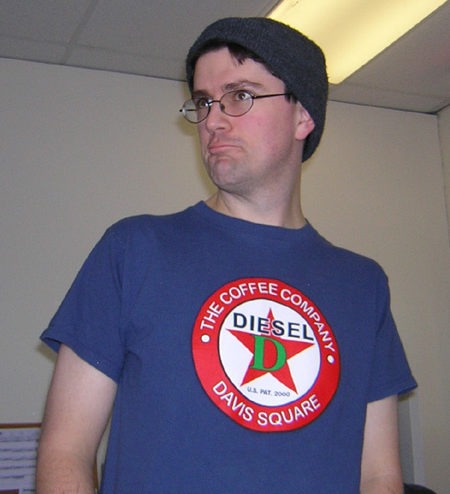
Monkey See, Monkey Do
Written by Sara Faith Alterman | Posted by: Anonymous
It’s no surprise that Daniel Thron is an animator.
A self-proclaimed babbler who peppers his rants with enthusiastic gestures, Thron is as vivid as the imagery cranked out by his award-winning CG animation company. Founded by Thron and fellow animator/visual effects junkie Brian White, RustMonkey Studios offers an impressive slew of creative services, including 3D/2D VFX and Cinematics, Motion Graphics, and Broadcast Design. The animation is strikingly cinematic, enveloping a style as ethereal and delicate as it is sci-fi and industrial — picture the graphic love-child of Sigmund Freud and Stephen Hawking.
Not too surprising from a couple of guys who keep their office stocked with sci-fi novels, Beaujolais and ice cream sandwiches.
SFA: What’s your background? Have you always worked in digital animation?
Thron: I started out as a freelance illustrator, doing really boring jobs, really awful jobs. For my first big job, I did over a hundred schematics of lawn chairs for the sides of the boxes that actually contained the lawn chairs. I kept on trying to convince myself "No, really, it’s kind of close to what I want to do!" But it was the worst. I got into illustration because it was the only thing I knew how to do. And I almost went crazy drawing lawn chairs! Then I did a series of teddy bear illustrations for boxes, and finally they asked me to do an Easter card which was a bunny standing on these blocks; this pink, happy bunny. It was ridiculous. It was an enormous painting, too, because they had to scale it down, so it was huge, this painting of a pastel pink bunny and all these wooden boxes that said "Hoppy Easter." And I got done painting this thing, and I literally broke down in tears, like, this is ridiculous. This is as far away from what I want to do as I could possibly be. And so I gave up after that. Then I worked for a video gaming company, where I developed the style that we now use for animation.
SFA: How did you form RustMonkey?
Thron: Brian and I worked together at the video gaming company. I was the creative director there, Brian was the senior artist, and we had been warned of each other’s ridiculous egos! It turned out that we had hugely similar interests, and demanded the same things all the time, so when we worked there we got into a great partnership. When that company collapsed, we’d both been through a couple of companies collapsing, and had both grown tired of working for other people. There was too much we wanted to get done. So, we decided to go into business together about three and a half years ago. The gag is that we do all this stuff that we enjoy doing, like ad work, and animation. We want to take all the enormous profits from that and make our own actual movies, because we’re nerds. We want to make better movies, movies that we’d like to see, like science fiction movies.
SFA: Who are your clients? Any projects in the works?
Thron: We’ve done stuff for the Discovery Channel, Nova, Sony Interactive, The Boston Museum of Science, and it’s all been stuff that’s really fun to work on. Whatever we work on, we find a way to make it cool; we don’t want to produce stuff that people would be disappointed in. The goal of the company is to try and jazz up everything we do as much as we can, to tweak everything we get involved in towards the stuff we want to do anyway. We take a simple ad job, for example, for a car, and start applying tools that we secretly have been developing for our own material, to see if we can apply them in a public lens, see what people think of it. Right now, we’re doing an ad for a video game. [Note: At press, Thron couldn’t reveal the title].
SFA: Being a younger company, do you find yourself really having to fight for these jobs? How do you get your name out there?
Thron: We’ve been really, really lucky. I think that we’ve actually done a minimal amount of promotional work and advertising. People know us from the video game industry. With video games, word spreads in a very cliquey way, there are certain people that get talked about a lot and sometimes credited with stuff that they had no relation to whatsoever, but their name gets thrown around. I think that Brian and I are lucky enough to have those relationships; people have heard our names get thrown around enough because of good, successful games that we’ve been attached to. Brian also did a lot of work for Nova and the Discovery Channel doing freelance animation.
People don’t want to spend a lot of time trying to find the right people. If they find someone who’s really good, they keep going back to that person. We have a number of relationships like that, where people keep on coming back to us. That’s helped us. But now we’re trying to get, we’re sending out billions of reels, in the past few months we’ve made a much greater market impression that we’ve ever made. And it’s for a couple of reasons that we’re doing well. But I want to have more time to do our own stuff. We need to have enough people to do that kind of material, so we want to try and expand. I feel like we’re a little insular right now.
SFA: What’s the future looking like for RustMonkey?
Thron: We’d like to get involved with the Boston film community. Talk to everybody and get them excited about making movies in Boston that aren’t "Good Will Hunting" based. "Good Will Hunting" is a great, great movie, but I think that part of the problem with it is that the whole area has really defined itself by making that kind of movie. There’s a limited market for that; there’s one "Good Will Hunting", and a whole lot of other movies that are kind of like it that don’t do very well.
We’d like to get filmmakers in Boston excited about doing stuff that they didn’t think they could do — like make movies with special effects in them, whatever the special effects are. We [RustMonkey] could handle that. It’s easy to do. I think that there’s this conceptual block for everybody here, like, oh we can’t do that, it’s not like we’re Hollywood. But we’ve got computers, we can do it! It’s here! It’s not even expensive! I have nothing against LA, but I think that when you get a bunch of people that set up the Hollywood system, you get a certain character of film that’s produced all the time. You can change that by going to different places. You can have a whole different flavor of movie. I think that we [Boston] could do more than we’re doing, just by believing that we could actually pull it off.
When we talk about doing special effects movies, though, we’re not necessarily talking about science fiction movies. There are movies like "The Hours," which was loaded with special effects, and you don’t even think about it. And that’s the kind of stuff we’d like to do. We do love science fiction movies, we want to make science fiction movies, but we also want to just make movies. And if you make a movie that has no special effects in it, that’s fine. So we don’t want to pigeonhole ourselves into these nerds.
SA: Your filmmaking style seems pretty influenced by science fiction, though.
Thron: I do think that science fiction is good fun. It’s cool, it makes great movies! The thing that you can really use the stuff for, though, is that you can tell wholly other stories about really serious things and get people to think about those things objectively. So, let’s say you take the polarized political climate right now, and talk about it objectively [in a film]. People think "Oh no, it’s just a science fiction movie! It’s just aliens! Oh, I love aliens!" and they come out of the movie actually thinking about things that they wouldn’t have given time to before. The more obvious you are, the less people are into it.
We are designing a short film right now, which has, we hope, a more partisan view. There are special effects, gun fights, everything you would expect in a science fiction movie. But the set-up is meant to convey something richer than a Will Smith movie.
SFA: For the record, what exactly is a RustMonkey?
Thron: Well, MonkeyFuel was taken. The two funniest words we can think of are ‘monkey’ and ‘slacks’. And so we wanted to be called MonkeyFuel, we wanted to have just a picture of a banana [as a logo]. At three o’clock in the morning, it was the funniest thing we had ever heard. But it was taken by some game company that had set up and didn’t produce anything! We knew we wanted to keep monkey, so we thought about it… "MonkeySlacks," "MonkeyMonkey." There was a serious discussion about MonkeySlacks for a while. People always remember RustMonkey; it’s become its own thing. It generates its own publicity. I mean, people either think that we fix cars, or make movies.
For more information on RustMonkey, check out www.rustmonkey.com.









